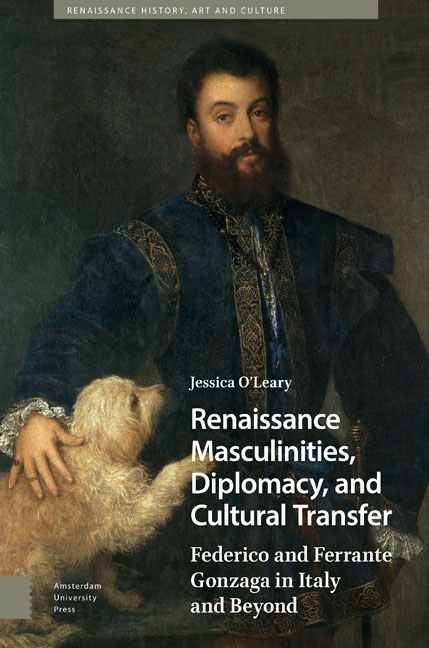 Renaissance Masculinities, Diplomacy, and Cultural Transfer
Renaissance Masculinities, Diplomacy, and Cultural Transfer Published online by Cambridge University Press: 08 May 2024
Abstract
This chapter analyses the legacies of both brothers and the emphasis that writers, biographers, secretaries, and artists placed on preserving a particular type of elite martial masculinity. Throughout the sixteenth century, war, confessional conflict, and the threat of further invasion from the Ottoman Empire created a crisis of masculinity in Italy that led to biographers of Ferrante Gonzaga publicising the captain's life as a pedagogical tool for young men. Federico Gonzaga, although less militarised, was nonetheless remembered using different classical and contemporary traditions. The combined effect of their legacies reveals the desire of contemporaries to shape the next generation of Italian rulers and captains by celebrating Hispanophile predecessors.
Keywords: Gender, Gonzaga, Italian Wars, Biography, Funeral Orations
In 1563, Alfonso Ulloa's Vita del valorosissimo e gran capitano Don Ferrante Gonzaga was published in quarto by the Venetian bookseller, Nicolo Bevilacqua. In five books totalling over two hundred folio, the Spaniard described the deeds not only of Ferrante Gonzaga, but of “many other princes and captains” and the “wars of Italy and other countries, beginning in the year 1525, when Guicciardini finished his Historie, until 1557.” The title page was followed by a Spanish-language sonnet written by Antonio de Gusman and dedicated to Ferrante's son, Cesare. The sonnet serves as an introduction to the Vita, both in terms of its subject matter, but also its primary themes:
He who always lived among the Spaniards
Protector, defender, honourable and guardian
And to his enemies, enemy
Defending his Kingdoms and his glory
It was fitting that, in dying,
He should be remembered in life (as a friend)
By such a nation, a witness
To all that he did in the world.
Magnanimous Lord CESARE GONZAGA
Alonso de Ulloa took this task
For your invincible father, Don Fernando
So that Spain may repay its debt
And the brilliance of he who shone
May endure perpetually in our era.
The placement of the sonnet, its authorship, and its language immediately prime the reader for two of the key themes of Ulloa's Vita: the close connection between Ferrante and Spain, and the celebration of the virile character traits traditionally associated with Italy's elite men.
To save this book to your Kindle, first ensure no-reply@cambridge.org is added to your Approved Personal Document E-mail List under your Personal Document Settings on the Manage Your Content and Devices page of your Amazon account. Then enter the ‘name’ part of your Kindle email address below. Find out more about saving to your Kindle.
Note you can select to save to either the @free.kindle.com or @kindle.com variations. ‘@free.kindle.com’ emails are free but can only be saved to your device when it is connected to wi-fi. ‘@kindle.com’ emails can be delivered even when you are not connected to wi-fi, but note that service fees apply.
Find out more about the Kindle Personal Document Service.
To save content items to your account, please confirm that you agree to abide by our usage policies. If this is the first time you use this feature, you will be asked to authorise Cambridge Core to connect with your account. Find out more about saving content to Dropbox.
To save content items to your account, please confirm that you agree to abide by our usage policies. If this is the first time you use this feature, you will be asked to authorise Cambridge Core to connect with your account. Find out more about saving content to Google Drive.